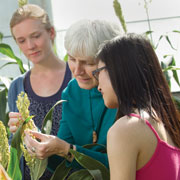Twitter and Facebook will promote public education in biotechnology.
Peggy Lemaux has been awarded a $105,700 grant from the American Society of Plant Biologists to continue and enhance an award-winning educational program that promotes understanding of biotechnology.
For more than 20 years, Lemaux and her team have developed and disseminated educational resources related to biotech in unique and interesting ways. Lemaux is an Extension Specialist in the department of Plant & Microbial Biology in the College of Natural Resources at UC Berkeley.
In the late 1990s, Lemaux and her team started ucbiotech.org as a platform for disseminating the displays, games, and 4-H curriculum they developed on issues such as food, agriculture, agricultural practices, and biotechnology. With this 2011 American Society of Plant Biologists Education Foundation grant, Lemaux and colleague Barbara Alonso will update information and enhance user-friendly interfaces for the biotechnology resources offered on the site. The duo also will enhance, update, and expand their educational resources catalog and continue to loan interactive displays for enhancing public understanding of biotechnology to users around the country. Lemaux and Alonso will also systematically develop and monitor social media, including Facebook and Twitter, to promote educational resources
American Society of Plant Biologists Education Foundation
 The Education Foundation was founded in 1995 to provide information and resources to increase the public’s knowledge about the role of plants in all areas of life. Its flagship activity is the grants program, which provides funding for activities led by Society members that enrich the public’s understanding of the following:
The Education Foundation was founded in 1995 to provide information and resources to increase the public’s knowledge about the role of plants in all areas of life. Its flagship activity is the grants program, which provides funding for activities led by Society members that enrich the public’s understanding of the following:
- Importance of plants for the sustainable production of medicine, food, fibers, and fuels;
- Critical role plants play in sustaining functional ecosystems in changing environments;
- Latest developments in plant biotechnologies, including genetic modifications that enhance the disease and stress resistance of crops;
- Contributions of discoveries made in plants to discoveries that improve human health and well-being; and
- Range of careers related to plant biology or available to plant biologists.
The Education Foundation especially seeks projects that will produce resources that can be widely shared and disseminated and programs or relationships that can be sustained over time.
Other Winning Projects
Other winning projects (each of which earned a $105,700 grant) include:
- Plants iView
Andrew Leakey, University of Illinois at Urbana-Champaign
Plants iView was initiated by the Plant Biology Association of Graduate Students (PBAGS) at Illinois in recognition of the challenges of interacting with the surrounding community to promote and communicate plant science to a general audience. Communication of science is a key element for the development of teacher–scholars, but these skills are often overlooked within formal graduate training programs. Leakey will use his 2011 Education Foundation Grant to develop several aspects of the Plants iView project: (1) creating an interactive learning environment for middle school students that will allow graduate students to communicate higher-level concepts about plant science through small group leadership, (2) developing lesson plans and multimedia instructional supplements for small-group activities in collaboration with middle school science teachers, and (3) creating a project webpage/blog for broader dissemination of inquiry-based lesson plans and materials.
- TRAINED – Translating Research on Arabidopsis Into a Network of EDucational Resources
Erich Grotewold and Jelena Brkljacic, Ohio State University
In 2010, as an extension of the Arabidopsis Biological Resource Center’s (ABRC’s) mission to acquire, preserve, and distribute resources important to the Arabidopsis community, the Ohio State team began the development of an educational outreach program. The program was designed to bring Arabidopsis teaching tools to K–12 settings and expand their use in undergraduate education. To gain experience and feedback from students, teachers, and administrators, ABRC partnered with three schools in Ohio to create a series of hands-on exercises named "Greening the Classroom: Bringing the Model Plant Arabidopsis from the Bench to the Classroom.”
- 12 Principles of Plant Biology Coloring & Activity Book and Evaluation Tool
Alan Jones, University of North Carolina at Chapel Hill and Jane Ellis, Presbyterian College
Plants are underrepresented in K–12 instruction. The current efforts to meet this need will be furthered by the development and dissemination of a coloring and activity book designed to engage the minds of preschoolers and young children. The book will use fun images developed to reflect key science content and quality artistry. Using these images in combination with vetted, age-appropriate educational activities, Jones and Ellis will develop a resource that will teach the 12 principles of plant biology at a level understandable to youngsters.
A major goal of this project is to establish the baseline for an understanding of plant biology by young children. The team will develop an evaluation tool currently termed ”Draw a Plant” where student drawings of plants will be evaluated for accuracy, helping to gauge the effectiveness of the coloring book. Such a tool is also expected to be useful in evaluating other plant science educational products targeted at a similar age group. Jones and Ellis also will engage evaluation experts from the University of North Carolina’s School of Education. The importance of this type of cross-campus outreach is another strong benefit of this project.
More Information
Peggy Lemaux's Page at UC Berkeley
